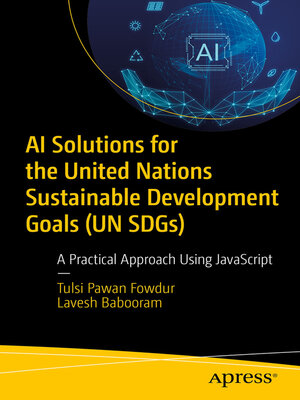AI Solutions for the United Nations Sustainable Development Goals (UN SDGs)
ebook ∣ A Practical Approach Using JavaScript
By Tulsi Pawan Fowdur

Sign up to save your library
With an OverDrive account, you can save your favorite libraries for at-a-glance information about availability. Find out more about OverDrive accounts.
Find this title in Libby, the library reading app by OverDrive.



Search for a digital library with this title
Title found at these libraries:
| Library Name | Distance |
|---|---|
| Loading... |
Learn the United Nations Sustainable Development Goals (UN SDGs) and see how machine learning can significantly contribute to their realization. This book imparts both theoretical knowledge and hands-on experience in comprehending and constructing machine learning-based applications for addressing multiple UN SDGs using JavaScript.
The reading begins with a delineation of diverse UN SDG targets, providing an overview of previous successful applications of machine learning in solving realistic problems aligned with these targets. It thoroughly explains fundamental concepts of machine learning algorithms for prediction and classification, coupled with their implementation in JavaScript and HTML programming.
Detailed case studies examine challenges related to renewable energy, agriculture, food production, health, environment, climate change, water quality, air quality, and telecommunications, corresponding to various UN SDGs. Each case study includes related works, datasets, machine learning algorithms, programming concepts, and comprehensive explanations of JavaScript and HTML codes used for web-based machine learning applications. The results obtained are meticulously analyzed and discussed, showcasing the pivotal role of machine learning in advancing the relevant SDGs.
By the end of this book, you'll have a firm understanding of SDG fundamentals and the practical application of machine learning to address diverse challenges associated with these goals.
What You'll Learn
Who This Book Is For
Data scientists, machine learning engineers, software professionals, researchers, and graduate students.







